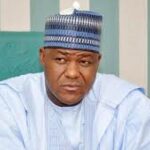President-elect, Asiwaju Bola Ahmed Tinubu, should move quickly to stabilize Nigeria’s macroeconomic system by undertaking wide-ranging reforms in oil and gas industry, the regulatory environment, and pursue fiscal consolidation.
“The Nigerian economy is in a stumbling and fragile state and in dire need of a new direction. The political transition offers a great opportunity to chart a new course,” Dr. Muda Yusuf, Director of Centre for the Promotion of Private Enterprise,” said on Sunday in a statement.
Yusuf said the administration should establish quality economic governance for signalling and investors’ confidence.
On the fiscal space, he said the president-elect should reform the nation’s tax regime to ensure efficiency in tax administration, reduce tax evasion and tax avoidance and eliminate multiple taxation. The new administration should also eliminate the fuel subsidy to save an estimated N7 trillion annually, he said.
- NIGERIA DAILY: How Alleged Millitary Brutality Is Leading To Death And Hospitalisation In Katsina
- PDP govs, NWC, BoT, others protest Tinubu’s victory today
The government should also unlock more income from revenue-generating agencies through enhanced efficiency of their operations.; initiate budget reforms to ensure fiscal discipline, curb budget padding, and curb duplication of projects and review the service wide votes to ensure transparency, he said.
A bond analyst who pleaded anonymity said, however, that the number one problem the new president should tackle is the controversial petroleum subsidy.
“The first thing is to cancel it in totality. It has to go in totality. It’s not reducing it by 60% or anything. It has got to,” he said. His position is opposite to Yusuf’s, he counselled that the government should “remove petrol subsidy with minimum shocks to the economy and the citizens”.
Pointing out that removing the subsidy goes beyond executive pronouncement, the bond analyst said it would require the repeal of some relevant legislations that sustain the subsidy programme. He identified the PPRA and the Petroleum Equalisation laws as part of those that have to go. “They should repeal all of them. And until they are repealed, forget it,” he said.
He said that while the current administration said initially there was no petroleum subsidy, it has ended up spending over N10trn on it.
On monetary policy, Yusuf called for the elimination of foreign exchange subsidies to unlock a minimum of N3 trillion revenue annually from the sale of CBN forex to the official foreign exchange window.
Yusuf also called for the removal of impediments to market mechanisms in allocation of forex. “This will boost inflows from Foreign Direct Investment, Foreign Portfolio Investment, Export Proceeds and Diaspora remittances,” he said.
Continuing, the bond analyst said the new president’s policies should be different from some of the policies of the current administration. These include not borrowing from the Ways and Means of the Central Bank, an action that contributed to the burgeoning of the nation’s debt stock. Similarly, there should be no fixed exchange rate policy, just as there should be no excessive borrowing by the government.
He also said that under the present administration, the size of the government has been bloated with the creation of new departments, which should be compressed.
According to Yusuf, the new government should “demonstrate unmistakable commitment to the implementation of the Petroleum Industry Act,” noting that this would attract more investment into the oil and gas sector
“The new president should also appoint a substantive minister of Petroleum Resources “to promote professionalism and transparency in the sector. The practice of the President assuming the role of Minister of Petroleum should be discontinued,” Yusuf said.
Nigeria’s oil revenue nosedived last year as a result of the activities of oil thieves in the oil-producing region. But this has been tackled through a military operation against the gang, and Yusuf said this “impressive momentum to tackle oil theft should be sustained in order to boost oil production”.
To achieve these, the president-elect should set up a Transition Committee on the Economy “to come up with propositions of what needs to be done differently and ensure the delivery quick wins in the first one month of the administration”.

 Join Daily Trust WhatsApp Community For Quick Access To News and Happenings Around You.
Join Daily Trust WhatsApp Community For Quick Access To News and Happenings Around You.

